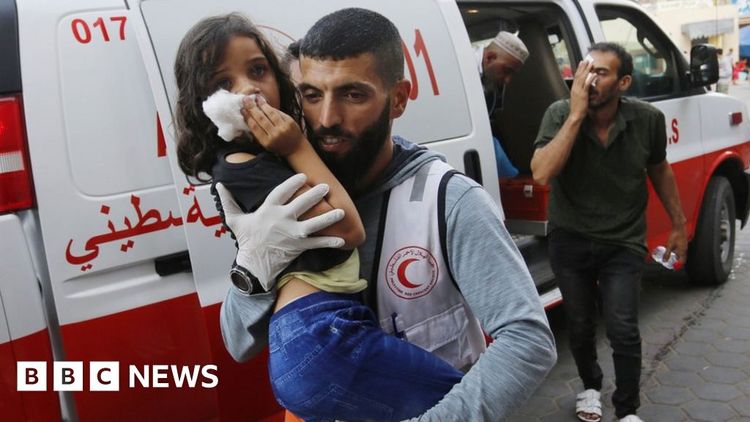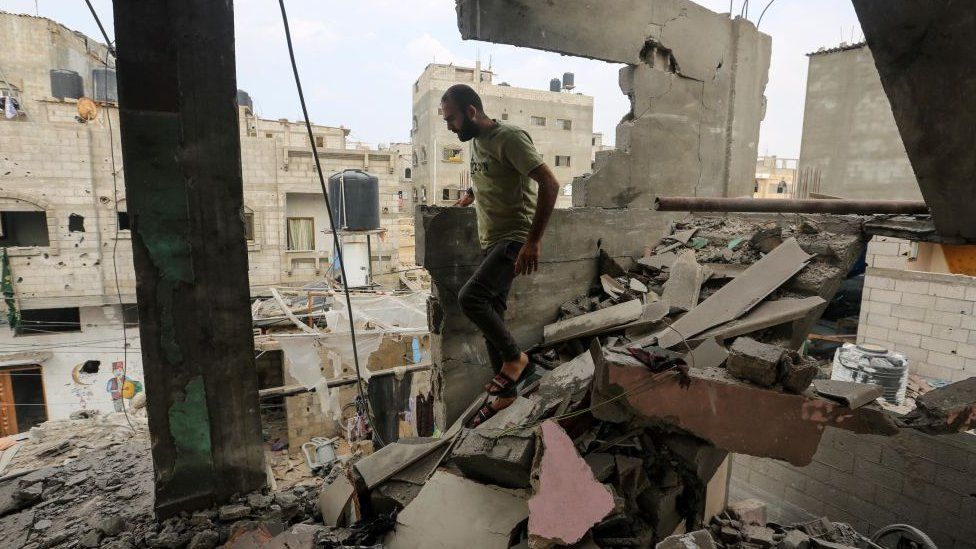Gaza 'disconnected from the planet' - but messages of fear trickle out

The source of the image used in this blog post comes from Getty Images.
A person sifts through the debris of a demolished structure.

In Jerusalem, Alice Cuddy and Tom Bateman collaborated to write this blog section.
A journalist based in a central city in Gaza has sent a message via voice note, as communication lines in the area have been severely disrupted.
Halfway through the audio, there is a loud blast that can be heard in the background.
He states that the condition is exceedingly hazardous, and a considerable number of individuals are unaware of the fate of their family members from the previous night.
The voice message sent via WhatsApp from the urban center of Deir al-Balah is one of the limited sources revealing what is occurring in Gaza and how the non-combatants are managing since Israel escalated its bombings from the sky and broadened its land offensives on last Friday night.
NetBlocks, a group that monitors the internet, has reported a significant drop in connectivity in the enclave. Due to this blackout, the locals are unable to communicate with their loved ones, and even emergency services are inaccessible, which includes ambulances that are essential for transporting the injured.
A lot of individuals residing in Gaza are currently unapproachable. WhatsApp messages are reflected with only one grey checkmark, indicating that they have been dispatched but not accepted. Calls are being directed towards voicemail messages.
During our recent communication with a professor in Gaza on Friday, he expressed his fear of complying with the Israeli evacuation orders to move south. He was worried that his family might be hit during the journey by an attack. Unfortunately, we haven't been able to contact him since then.
However, only a few individuals in Gaza possess international SIM cards that have the capability to access Israeli or Egyptian phone towers. The BBC has managed to establish intermittent communication with a handful of them.
This includes the reporter in Deir al-Balah, who portrays the environment as agitated and disoriented.
"He says that there are individuals who think that the absence of news updates delivered through messages implies that nothing is occurring and this provides them with a sense of relief."
Some people are extremely anxious because they have no communication with any of their dear ones.
The image credit goes to Mohammed Saber from EPA-EFE/REX/Shutterstock.
Up in the northern region at Gaza City, the BBC got in touch with another journalist via a brief phone conversation. This individual, who opted to remain anonymous, referred to the bombing that occurred during the night as "savage".
He stated that they never anticipated making it to the morning and recounted that a barrage of bombing occurred in various locations such as streets, government establishments, open areas, and even the beach.
The precise number of casualties and fatalities within the last day remains unclear. Some images and clips depict widespread devastation, and locals are seen working to extract individuals from the rubble.
There is a picture that is too shocking to display, where a man can be observed holding the corpse of a young child.
On a different video that was shared on Instagram, a man with severe injuries was hastily escorted out of a structure while people in the vicinity screamed and pleaded for emergency medical assistance.
They chose to place the man inside the rear of a vehicle instead.
Israel-Gaza Conflict: In-Depth Coverage
Photographer Shebab Younis, who shared the video, spoke in a fragmented voice message about the dire situation he was witnessing, describing it as "disastrous."
According to him, we cannot communicate with those who have been targeted or harmed.
When houses are being bombarded, it can be extremely difficult due to a lack of communication and Internet access. This has a negative effect on numerous medical establishments and public buildings during bombings in their vicinity.
When asked about Israel's interference with communication in Gaza, Mark Regev, a high-ranking advisor from the Israeli government, responded to the BBC by saying that it is a typical tactic to disrupt communication with an enemy, comparing it to actions taken by the UK and US during past conflicts.
According to the United Nations, the power outage has placed the ordinary citizens at a high risk.
According to Volker Türk, the UN High Commissioner for Human Rights, ambulances and civil defence teams are facing difficulties in finding those who are injured or still trapped under the rubble, which is believed to be thousands of people.
Regular people are now unable to get the latest information on where they can receive aid and where they may be at less risk. Several reporters are also restricted from reporting on the current condition.
The Minister of Communications in Palestine, Ishaq Sider, has stated that they are currently working on getting international roaming services up and running in Gaza.
Currently, a majority of individuals in the area lack a strong connection to the planet, as stated by one of our sources.
More information has been gathered by Muath Al Khatib, who has contributed to the reporting of this blog post.



























































